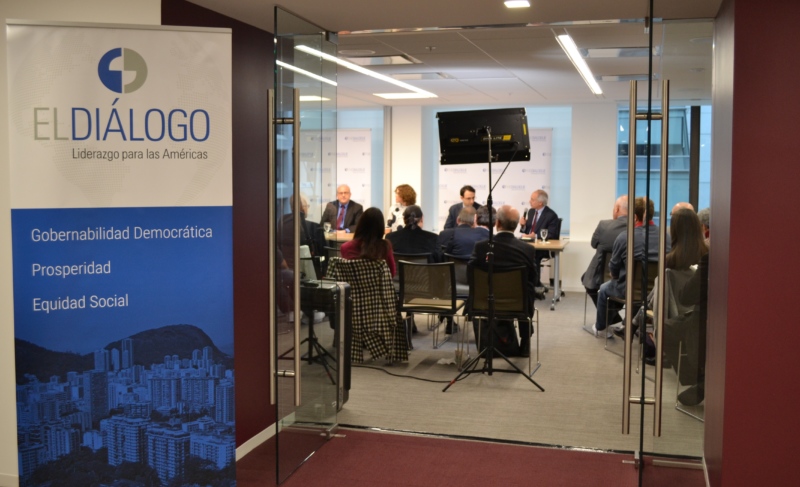Can Spain Solve the Cuba Problem?
By all accounts, Spain wants to bring change to the European Union’s Cuba policy. In so doing, it is tackling a foreign policy challenge that often sheds more heat than light.
Back in the early 1980s, when the Inter-American Dialogue was born, the United States under President Reagan was actively supporting the right-wing government of El Salvador in its bloody war against leftist insurgents, while at the same time secretly funding contras hoping to overthrow Marxist Sandinistas in neighboring Nicaragua.
Meanwhile, the region’s biggest countries — Argentina, Brazil and Mexico — were cash-strapped, debt-ridden and beholden to the IMF; only oil-exporting Venezuela seemed to be doing well. Throughout the hemisphere, anti-American sentiment was rampant, said Michael Shifter, longtime president of the Dialogue, a D.C.-based think tank focused on the Western Hemisphere.
“The main concern was the wars in Central America, but also there was a debt crisis. The ’80s was a lost decade for Latin America,” said Shifter, recalling the 1982 Falklands War between Argentina and Great Britain, the rise of Colombia’s FARC insurgency and the collapse of pro-U.S. military dictatorships in both Argentina and Brazil. “There were lots of big changes going on, and tremendous misunderstandings between Latin America and the United States.”
These days, a different Republican is in the White House — and it seems those tremendous misunderstandings have returned with a vengeance.
Donald Trump’s verbal assault against Mexicans as “rapists, criminals and drug dealers,” his insistence on building a border wall and forcing Mexico to somehow pay for it and his unforgiving rush to deport undocumented immigrants — including those with no criminal records — have sparked a groundswell of resentment south of the Río Grande the likes of which have not been seen in a generation.
“Mexico had a prominent role in trying to encourage diplomatic solutions in Central America, which was very much at odds with the Reagan administration’s approach. In some respects, relations now may be even at a lower point [than in the 1980s] because the rhetoric has been so personally offensive and aggressive. It really hits very hard at the visceral level,” Shifter told The Washington Diplomat in a lengthy interview.
“Mexicans, and by extension a lot of Latin Americans, feel this almost as a personal affront,” he continued. “That has really set things back. It’s not so much that Trump has been saying all these things, but that he was saying all these things without any pushback during the Republican primaries. The fact that people are silent in the face of this rhetoric concerns me a great deal.”
Region a ‘Stepchild’ of U.S. Foreign Policy
The collapse of democracy in Venezuela also deeply worries Shifter — along with the drug-fueled violence that today plagues much of Central America’s so-called “Northern Triangle” and the Trump administration’s general lack of interest in the region.
As head of Washington’s leading think tank devoted to Latin American issues, Shifter makes no attempt to hide his frustration.
“I understand that Latin America is not the highest priority. It doesn’t have nuclear weapons, and it’s obviously not the Middle East or North Korea. But that’s the problem,” he told us. “The United States should be able to deal with all regions in a thoughtful and constructive way. Latin America has traditionally been taken for granted because it doesn’t pose a real threat. It’s sort of a stepchild of U.S. foreign policy.”
Shifter, 62, is no newcomer to the region.
Born and raised in East Rockaway, N.Y., he learned Spanish at the age of 14 while living in Mexico on an exchange program. He added Portuguese to his resume in 1972 as a student in Portugal.
“A critical point for me was the time I spent in Colombia, which was my third year of college at Oberlin,” Shifter said. “Back then, in 1975-76, Bogotá was one of the major destinations for U.S. exchange students. What had been more of a cultural interest evolved into a political concern. I had read a lot of [Colombian novelist Gabriel] García Márquez and saw the tremendous inequities. For college students, this was about fighting for social justice.”
By all accounts, Spain wants to bring change to the European Union’s Cuba policy. In so doing, it is tackling a foreign policy challenge that often sheds more heat than light.
When Haiti was struck by a devastating earthquake, the administration of U.S. President Barack Obama quickly absorbed the depth of the tragedy and necessity of a robust U.S. response. Unless the U.S. adopts a proactive role, Haiti’s fragmented political landscape threatens to deteriorate into a political vacuum that will compound the current crisis.
Politics is swirling everywhere. Such are the ways of democracies, especially when oppositions come alive and defeat or threaten incumbents.
 Ben Raderstorf / Inter-American Dialogue
Ben Raderstorf / Inter-American Dialogue